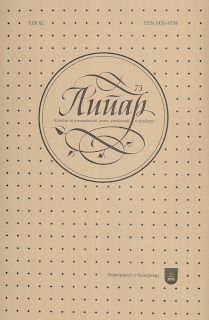ИНТЕРКУЛТУРАЛНА КОМУНИКАЦИЈА НА РАДНОМ МЕСТУ...: РОДНО ОЗНАЧЕНЕ ЛЕКСЕМЕ ЗА НАЗИВЕ ЗАНИМАЊА, ЗВАЊА И ТИТУЛА У СРПСКОМ И ЕНГЛЕСКОМ ЈЕЗИКУ
INTERCULTURAL COMMUNICATION IN THE WORK- PLACE: GENDER-SPECIFIC LEXEMES DENOTING OCCUPATIONS, FUNCTIONS AND TITLES IN THE SERBIAN AND ENGLISH LANGUAGES
Author(s): Katarina SubanovićSubject(s): Social Sciences, Language studies, Gender Studies, Foreign languages learning, Theoretical Linguistics, Applied Linguistics, Sociology, Language acquisition, Comparative Linguistics, Sociolinguistics, Descriptive linguistics, South Slavic Languages, Evaluation research, Studies in violence and power, Victimology, Philology, Stylistics
Published by: Универзитет у Крагујевцу
Keywords: intercultural communication;sexist language;politically correct speech;gender-specific lexemes;occupations;functions and titles
Summary/Abstract: This theoretical paper deals with gender-lexicalized names for occupations, functions and titles in the Serbian and English languages. The main task is to provide a summary of Serbian and English literature in terms of a given topic so as to compare general attitudes and conclusions in the two languages. The language material consulted for the writing of this paper included scientific studies, academic debates and newspaper articles, since this topic represents a social phenomenon which can be pointed at by the interaction between scientist (academic studies, debates) and the public (newspaper articles). As for the methodological procedure, it involved several steps. Firstly, we created tabular annotated bibliographies which contained the following data: the title of the paper/article, the subject matter of the paper/ article, the aim(s), methodology, the information on the participants in the study, or the information on the corpus, the main results, limitations and conclusions. Next, we selected the relevant parts for the problems we dealt with and included them in the appropriate parts of our paper. Eventually, based on the analyzed studies and newspaper articles, we made a conclusion regarding the given topic. The main results indicate that active efforts are made in both languages in order to eliminate sexist language and gender inequality. However, since English and Serbian are different in terms of the typological classification, the problem is approached differently in the two languages. To conclude, these results refer to the said corpus, thus further research is needed to consider the observed tendencies a rule.
Journal: Липар - часопис за књижевност, језик, уметност и културу
- Issue Year: XXI/2020
- Issue No: 73
- Page Range: 179-201
- Page Count: 23
- Language: Serbian

